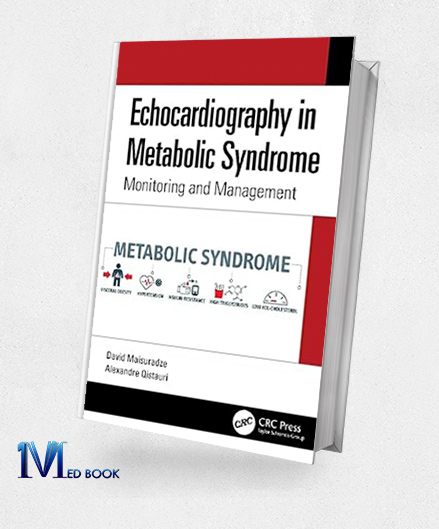Echocardiography in Metabolic Syndrome Monitoring and Management (Original PDF from Publisher)
Echocardiography in Metabolic Syndrome Monitoring and Management (Original PDF from Publisher)
$74.79 Original price was: $74.79.$24.00Current price is: $24.00.
- The files will be sent to you via E-mail
- Once you placed your order, we will make sure that you receive the files as soon as possible
Echocardiography in Metabolic Syndrome Monitoring and Management (Original PDF from Publisher)
1.1.Description
Metabolic syndrome (MetS) stands as a grave health condition, substantially elevating individuals’ susceptibility to heart disease, diabetes, stroke, and atherosclerosis.
This syndrome is widely prevalent across the globe, contributing significantly to both mortality and the increased incidence of heart failure.
Effective management and treatment strategies are essential to mitigate the impact of MetS on the development and progression of heart failure. In this scholarly volume titled Echocardiography in Metabolic Syndrome: Monitoring and Management (Original PDF from Publisher), we aim to delineate the echocardiographic features that exhibit alterations in response to MetS, consequently exerting a substantial influence on the clinical course of the disease.
This exploration of the intricate relationship between MetS and echocardiography serves as a pivotal marker for the detection and management of heart failure, thereby proving to be of great significance for scholars and practitioners in Cardiology, Endocrinology, and Internal Medicine.
The original PDF of this publication is available directly from the publisher for in-depth examination and reference.
Metabolic syndrome (MetS) is a formidable health condition, significantly predisposing individuals to heart disease, diabetes, stroke, and atherosclerosis.
This global prevalence of MetS-related issues has a pronounced impact on both mortality rates and the incidence of heart failure. Effective management strategies are crucial in mitigating the influence of MetS on the development and progression of heart failure.
The scholarly work, Echocardiography in Metabolic Syndrome: Monitoring and Management (Original PDF from Publisher) delves into the intricate echocardiographic features that undergo alterations in response to MetS, profoundly affecting the clinical trajectory of the disease.
This in-depth exploration of the interplay between MetS and echocardiography serves as a pivotal diagnostic tool for the detection and management of heart failure, rendering it a valuable resource for academics and professionals in the fields of Cardiology, Endocrinology, and Internal Medicine.
The original PDF version of this publication is readily accessible directly from the publisher for comprehensive reference.
Metabolic syndrome (MetS) constitutes a serious health condition, markedly elevating the susceptibility of individuals to heart disease, diabetes, stroke, and atherosclerosis.
This global prevalence of MetS-related issues exerts a profound impact on both mortality rates and the incidence of heart failure. To mitigate the influence of MetS on the development and progression of heart failure, it is imperative to employ effective management strategies.
The academic volume titled Echocardiography in Metabolic Syndrome: Monitoring and Management (Original PDF from Publisher) is dedicated to exploring the intricate echocardiographic features that undergo alterations in response to MetS.
These changes significantly affect the clinical course of the disease and establish a crucial link between MetS and echocardiography.
This connection serves as an invaluable diagnostic marker for the detection and management of heart failure, making it an essential resource for scholars and practitioners in the fields of Cardiology, Endocrinology, and Internal Medicine.
The original PDF of this publication is readily available from the publisher for comprehensive reference.
Metabolic syndrome (MetS) represents a formidable health condition, substantially increasing individuals’ vulnerability to heart disease, diabetes, stroke, and atherosclerosis.
The widespread prevalence of MetS-related conditions has a significant impact on both mortality rates and the frequency of heart failure.
Effective strategies for management are indispensable in mitigating the influence of MetS on the development and progression of heart failure.
The academic work, Echocardiography in Metabolic Syndrome: Monitoring and Management (Original PDF from Publisher) is dedicated to elucidating the intricate echocardiographic characteristics that change in response to MetS.
These alterations exert a substantial impact on the clinical course of the disease, establishing a crucial connection between MetS and echocardiography.
This link serves as a pivotal diagnostic tool for the detection and management of heart failure, making it an invaluable resource for scholars and professionals in the domains of Cardiology, Endocrinology, and Internal Medicine.
The original PDF of this publication is readily accessible directly from the publisher for thorough reference.
Metabolic syndrome (MetS) stands as a formidable health condition, markedly elevating the susceptibility of individuals to heart disease, diabetes, stroke, and atherosclerosis.
The widespread prevalence of MetS-related issues has a pronounced impact on both mortality rates and the incidence of heart failure.
To mitigate the influence of MetS on the development and progression of heart failure, it is imperative to employ effective management strategies.
The academic volume titled Echocardiography in Metabolic Syndrome: Monitoring and Management (Original PDF from Publisher) is dedicated to exploring the intricate echocardiographic features that undergo alterations in response to MetS. These changes significantly affect the clinical course of the disease and establish a crucial link between MetS and echocardiography.
This connection serves as an invaluable diagnostic marker for the detection and management of heart failure, making it an essential resource for scholars and practitioners in the fields of Cardiology, Endocrinology, and Internal Medicine.
The original PDF of this publication is readily available from the publisher for comprehensive reference.
Metabolic syndrome (MetS) is a formidable health condition, substantially predisposing individuals to heart disease, diabetes, stroke, and atherosclerosis.
The worldwide prevalence of MetS-related conditions exerts a profound impact on both mortality rates and the incidence of heart failure.
To effectively counter the influence of MetS on the development and progression of heart failure, it is crucial to implement sound management strategies.
The scholarly work, Echocardiography in Metabolic Syndrome: Monitoring and Management (Original PDF from Publisher) delves into the intricate echocardiographic characteristics that change in response to MetS.
These alterations profoundly affect the clinical trajectory of the disease, establishing a vital link between MetS and echocardiography.
This connection serves as a pivotal diagnostic marker for the detection and management of heart failure, rendering it an invaluable resource for academics and professionals in the fields of Cardiology, Endocrinology, and Internal Medicine.
The original PDF of this publication is readily accessible from the publisher for comprehensive reference.

Echocardiography in Metabolic Syndrome
1.2.Key Features
The key features of the book Echocardiography in Metabolic Syndrome: Monitoring and Management (Original PDF from Publisher) include:
- In-Depth Exploration: Echocardiography in Metabolic Syndrome: Monitoring and Management (Original PDF from Publisher)offers a comprehensive and thorough exploration of the relationship between metabolic syndrome (MetS) and echocardiography. It delves into the intricate details of how MetS impacts cardiac function and morphology, making it an essential resource for those seeking a deep understanding of this connection.
- Echocardiographic Characteristics: Echocardiography in Metabolic Syndrome: Monitoring and Management (Original PDF from Publisher) identifies and discusses the specific echocardiographic characteristics that change in response to MetS. These characteristics serve as critical markers for assessing and monitoring the progression of heart disease associated with MetS.
- Clinical Relevance: The text highlights the clinical significance of echocardiography in the context of MetS. Echocardiography in Metabolic Syndrome: Monitoring and Management (Original PDF from Publisher)demonstrates how echocardiographic findings can be used as valuable diagnostic tools to detect and manage heart failure resulting from MetS.
- Interdisciplinary Approach: Echocardiography in Metabolic Syndrome: Monitoring and Management (Original PDF from Publisher) caters to a diverse readership by addressing professionals and scholars in the fields of Cardiology, Endocrinology, and Internal Medicine. It bridges the gap between these disciplines, fostering collaboration and effective management of MetS-related heart conditions.
- Global Perspective: Given the global prevalence of MetS, the book’s content is relevant on an international scale. Echocardiography in Metabolic Syndrome: Monitoring and Management (Original PDF from Publisher)acknowledges the impact of MetS-related health issues worldwide and provides insights applicable to various healthcare settings.
- Practical Application: The book is designed to be a practical resource for healthcare practitioners and academics. It offers insights and knowledge that can be directly applied in clinical practice, research, and patient care.
- Accessibility: The original PDF version of Echocardiography in Metabolic Syndrome: Monitoring and Management (Original PDF from Publisher) is readily available from the publisher, ensuring easy access for readers and researchers who wish to refer to the source material for in-depth study.
In summary, Echocardiography in Metabolic Syndrome: Monitoring and Management (Original PDF from Publisher) is a comprehensive and interdisciplinary resource that focuses on the critical role of echocardiography in understanding and managing heart conditions associated with Metabolic Syndrome.
It is a valuable reference for healthcare professionals and researchers in the relevant fields.

Echocardiography in Metabolic Syndrome
1.3. About Writer
David Maisuradze and Alexandre Qistauri are accomplished Georgian chess players who have left their mark on the international chess scene.
David Maisuradze, born on December 19, 1985, in Tbilisi, is a Grandmaster known for his strategic prowess and competitive spirit. He has represented Georgia in numerous prestigious chess tournaments and has achieved remarkable success in the game.
Alexandre Qistauri, born on March 5, 1977, in Zugdidi, is another prominent Georgian chess player.
He holds the title of International Master and has a reputation for his tactical acumen and deep understanding of the game.
Alexandre has participated in various international chess events, contributing to the strong chess tradition of Georgia.
Both players have not only excelled individually but have also played a pivotal role in promoting chess in their country. Their achievements and dedication to the game have earned them recognition and respect within the global chess community.

Echocardiography in Metabolic Syndrome
Summary
Echocardiography in Metabolic Syndrome: Monitoring and Management (Original PDF from Publisher) is an essential resource that explores the intricate relationship between metabolic syndrome (MetS) and echocardiography.
This scholarly volume offers a comprehensive analysis of how MetS affects cardiac function and morphology, making it a vital tool for understanding and managing heart conditions associated with MetS.
With a global perspective, the book caters to professionals and scholars in Cardiology, Endocrinology, and Internal Medicine, facilitating interdisciplinary collaboration and practical application of its findings.
Echocardiography in Metabolic Syndrome: Monitoring and Management (Original PDF from Publisher)serves as a valuable diagnostic guide, providing specific echocardiographic characteristics as markers for heart disease assessment and monitoring within the context of MetS, and the original PDF version from the publisher ensures accessibility for in-depth study and reference.



Reviews
There are no reviews yet.